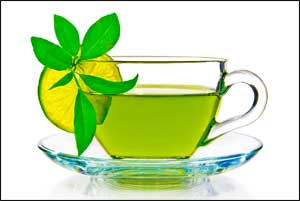- Home
- Editorial
- News
- Practice Guidelines
- Anesthesiology Guidelines
- Cancer Guidelines
- Cardiac Sciences Guidelines
- Critical Care Guidelines
- Dentistry Guidelines
- Dermatology Guidelines
- Diabetes and Endo Guidelines
- Diagnostics Guidelines
- ENT Guidelines
- Featured Practice Guidelines
- Gastroenterology Guidelines
- Geriatrics Guidelines
- Medicine Guidelines
- Nephrology Guidelines
- Neurosciences Guidelines
- Obs and Gynae Guidelines
- Ophthalmology Guidelines
- Orthopaedics Guidelines
- Paediatrics Guidelines
- Psychiatry Guidelines
- Pulmonology Guidelines
- Radiology Guidelines
- Surgery Guidelines
- Urology Guidelines
Green tea useful in prevention of heart attack and stroke

Epigallocatechin-3-gallate (EGCG), a compound found in green tea, could be beneficial for prevention of heart attacks and strokes caused by atherosclerosis, according to a new study published in the Journal of Biological Chemistry.
The study was conducted by David Middleton, Professor of Chemistry at Lancaster University, and colleagues have been researching on EGCG, a compound currently being studied for its ability to reduce amyloid plaques in the brain of the Alzheimer's disease patients.
Atherosclerosis is the accumulation of fatty material inside arteries leading to reduced blood flow to the heart and brain. In advanced stages of the condition, a protein called apolipoprotein A-1 (apoA-1) can lead to the formation of amyloid deposits, which are similar in structure to those associated with Alzheimer's disease. These deposits build up within atherosclerotic plaques. Here, they increase the size of the plaques, further restricting blood flow, and may also make the plaques less stable, increasing the risk of a heart attack or stroke.
Researchers found that EGCG binds to the amyloid fibres of apoA-1. This converts the fibres to smaller soluble molecules that are less likely to be damaging to blood vessels.
Now, the team are working on finding ways of introducing effective amounts of EGCG into the bloodstream without it being necessary to drink large and potentially harmful quantities of green tea. This could involve modifying the chemical structure of EGCG, making it easier to be absorbed from the stomach and more resistant to metabolism, or developing new methods to deliver the molecule to the plaques - such as via an injection.
"The health benefits of green tea have been widely promoted and it has been known for some time that EGCG can alter the structures of amyloid plaques associated with Alzheimer's disease, said Dr. Middleton.
"Our results show that this intriguing compound might also be effective against the types of plaques which can cause heart attacks and strokes."
Professor Sheena Radford, Director of the Astbury Centre for Structural Molecular Biology at the University of Leeds and co-author of the research, said: "The findings of this round of studies are very encouraging. We now need to apply the best scientific techniques to find how we can take the molecular EGCG element from green tea, and turn it into a functioning tool to combat life-limiting health issues."
For further information log on to 10.1074/jbc.RA118.002038

Disclaimer: This site is primarily intended for healthcare professionals. Any content/information on this website does not replace the advice of medical and/or health professionals and should not be construed as medical/diagnostic advice/endorsement or prescription. Use of this site is subject to our terms of use, privacy policy, advertisement policy. © 2020 Minerva Medical Treatment Pvt Ltd